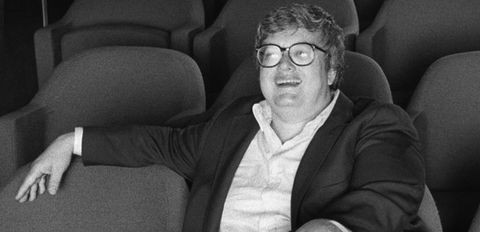It's unnerving. Sometimes writing a film review can feel like a confession. While some like to believe that critics as a species have some sort of hard-wired criteria for cinema, I believe reviews are inherently subjective. A reviewer's own life experience, cinematic awareness, and personal biases--for better or worse--inevitably play a part in how we read a film. When watching the Roger Ebert bio-doc Life Itself, my own views on life and death were a massive influence on how I responded to it.
I did not like this movie. And the reason can be boiled down to director Steve James (and perhaps Ebert himself) and I clearly disagree about how the dead should be remembered.
Roger Ebert was heavily involved in this documentary that aims to encapsulate his life, warts and all. His autobiography--also named Life Itself--does a lot of the heavy-lifting for the film, providing Ebert a voice, even after his actual one had been taken through aggressive cancer treatments. Adding to the orchestra of voices are a series of interviews with a string of old newspaper pals, his wife Chaz Ebert, his friend and admirer Martin Scorsese, and the late Gene Siskel's wife Marlene Iglitzen. Through these interviews, evocative photographs and outtakes of Siskel & Ebert, the rich life of this greatly beloved film critic, who helped make movies and movie criticism accessible to one generation after another, is revealed. And it's done in a way we're meant to believe Ebert would approve of.
Ebert urged James to shoot him in the hospital at a point where his health was inexplicably on the wane again. This is Ebert following his jaw removal. And rather than hiding this operation's physically devastating effects, James--with Ebert's awareness and sometimes urging--doesn't shy away from it. Even as he smiles and jokes through use of a voice-simulation computer, it's difficult to watch Ebert struggle and endure unimaginable pain. He can't speak, but here he is still the jolly man who was never afraid to live out loud. His life itself speaks to his belief in openness, from his public proclamation that he was in Alcoholics Anonymous, to his enthusiasm or vitriol for films, to his honesty about his cancer and failing health. Ebert refused to hide who he was, which is probably part of what makes his works so completely captivating.
The main thrust of Life Itself is showing us, in all possible forms, Ebert's signature moxie for life and passion for cinema. But as James spends more and more time with the present-day Ebert, a man who is fully aware he is dying, the joy of the documentary is killed by a mounting, crushing sadness. Eventually, Ebert rejects James's camera and cuts short their e-mail correspondence. He dies off screen, in private. But we have been witness to his decay. And to be honest, it's something I would rather not have seen. Something I'm not sure we should have seen.
It ultimately comes down to how we believe the dead should be remembered. I am not in the school of thought that insists someone's death instantly makes them a terrific person, above reproach so all sins on their part should be forgotten. I strive to remember those I lost for better and for worse, because to me it's that complexity that made them who they are. However, I am not convinced that there is much dignity in death. And so if there is one thing I try to forget of my departed loved ones, it's those ugly details and indignities death laid down like cruel breadcrumbs before taking them away. Had I known that Life Itself would show so many of Ebert's breadcrumbs, I wouldn't have gone to see this movie. I'd have preferred to remember him as I knew him before: full of life.
In the end, I struggle with the thought that even Ebert might have retroactively wished for more privacy in those final days. But even if he didn't, I feel Life Itself has let him down. Upon his death, the internet was alive with fans and admirers sharing kind thoughts, cherished memories, and relatable grief. This was because Ebert was a powerful force who brought joy, inspired passion, and encouraged risk in art. Life Itself takes a risk in veering so far into Ebert's last chapter. But as it left me thinking more about his death than his life, I fear the film failed him. Life Itself is ultimately nowhere near as inspiring, entertaining, or mirth-filled as the man himself. And for me, that is a profound and unforgivable disappointment.
Staff writer at CinemaBlend.
Most Popular






